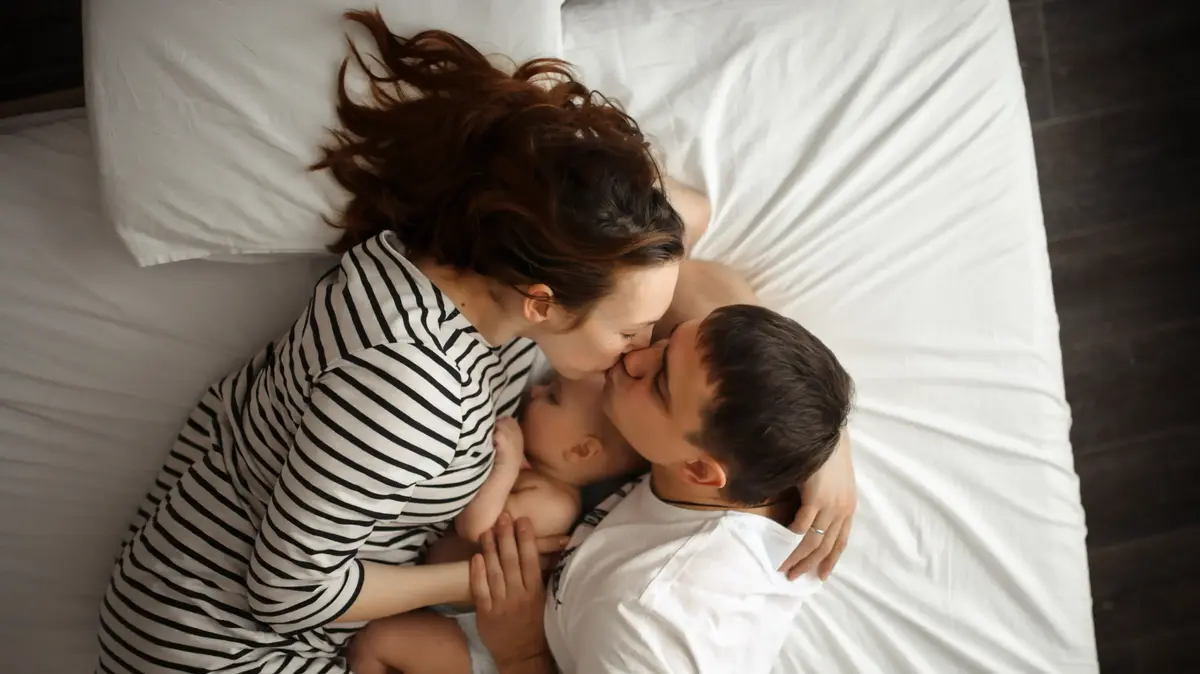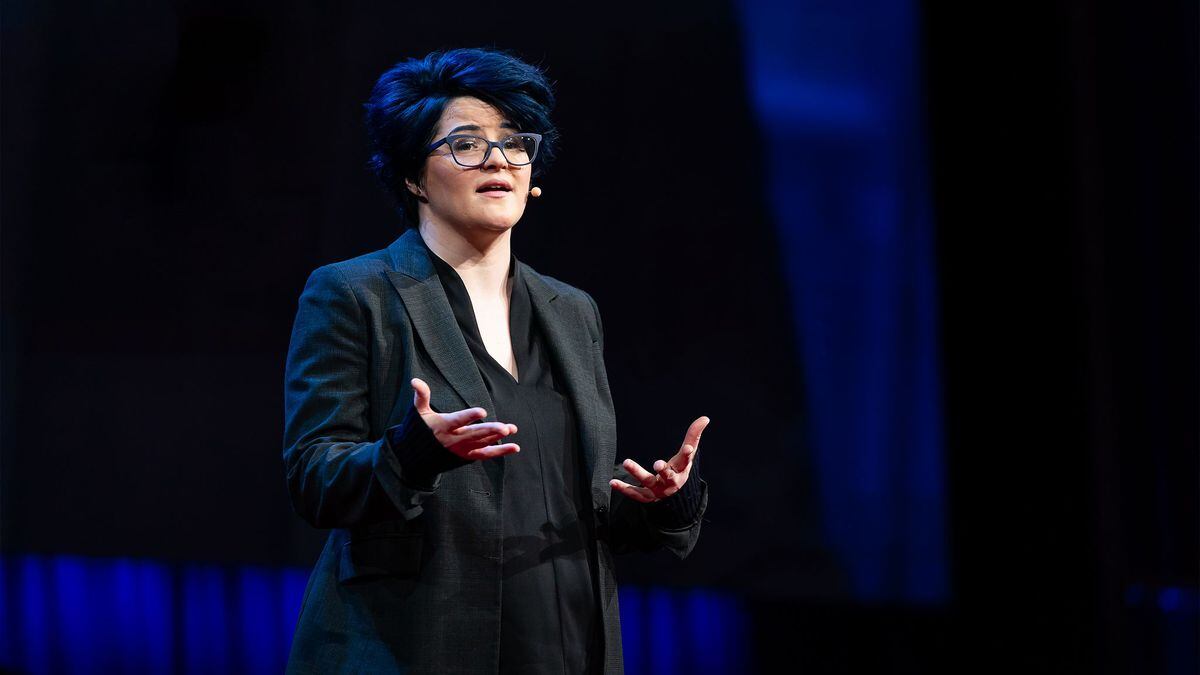Blanca Becerra laughs as she tidies up the house and the chicken with apples for dinner is baked little by little.
She has two daughters and a job.
She says that she lives "mentally tired" and until her second daughter was a year old, a few months ago, she did not feel like sex.
Now it seems that the wheel has started to roll: "We went from doing it all the time and everywhere to two or three times a week."
And she continues: "I don't want and I can't have the same rhythm as before I had my girls, before we didn't have so much work taking care of them, which, by the way, is little or not valued at all."
Becerra acknowledges that it is her husband "who pulls her" from her, who "demands friction because he needs to feel loved."
And she, pensive, admits: "And for me sex is complicity, a shot of self-esteem and it gives me energy, but it is true that I don't need it as much as before."
Sexual desire is something changeable and dynamic and "there is no greater erotic disruptor than having a child."
The sexologist Lorena Álvarez Frasquier affirms that during the puerperium the sexual hormones, estrogens and progesterone decrease, and that this allows prolactin to be secreted for lactation.
"The hormonal state negatively influences sexual desire, in addition to the emotional state, together with other factors such as lack of sleep, discomfort, pain, concern for the baby or difficulties with breastfeeding," she lists.
For the sexologist Sonia Encinas, sexuality is born from a surplus of energy, and if we live in deficit, both due to fatigue and lack of sleep, the desire to have sex is reduced.
More information
Why are there young couples, with desire and without pathologies, who have stopped having sex?
Victoria Tomás is a psychologist and sexologist, member of the Desmontando a la Pili sexual health cooperative and talks about the fatigue of parenting: "It is not just physical fatigue nor is it similar to what the workday produces, since it is a type of exhaustion that invades everything because the task does not let up and is of high intensity”.
In addition, she understands gender: one of the gaps between men and women is that their bodies have gone through pregnancy, childbirth, puerperium, and lactation.
His body has made a great overexertion of work, with which the fatigue, parenting aside, is multiplied.
"So the desire to have sex in each part of the couple changes in a different way, and that requires readjustments to find a new balance that satisfies the parties."
Reproductive acts such as giving birth influence sexual desire and the space to give it free rein.
Giving birth is a very intense experience and, according to the experts, a good birth makes it easier for everything to flow: the bond with the child, the relationship with one's own body, as well as sexuality.
Tomás affirms that, on the contrary, births that are experienced badly, either because there is obstetric violence or because one's own expectations have been frustrated (with a cesarean section, for example), generate more difficulties later.
He assures that it is not only important that births are respected and cared for, but also to have good emotional support so that the woman can emotionally process her experience and does not become a source of blockages.
Eroticism beyond intercourse
But where to reconnect?
“There is a piece of advice that we always give in sexology and it works well: it is necessary to broaden our understanding of our erotic life beyond intercourse and genitalia”, explains Tomás.
It can be enjoyed in many ways, the entire body is sensitive and “globalizing the erotic experience feels good”.
The fact that there is no intercourse does not mean that there cannot be sexual activity and enjoyment: "Kisses, hugs and caresses feel great and do not have to be simply a prelude to penetration, since they have value in themselves," he says. he.
Going through a pregnancy also changes the body.
In addition to the amount of sex, Blanca Becerra tells another significant fact: she prefers to do it without light.
She explains: “I have breastfed my two daughters for a long time, and I have gone from having it tight and firm to being empty, very saggy.
I try not to let this affect my sex life, but the light is better turned off and I'm always struggling with self-esteem”.
The perinatal psychologist Ester López Turrillo affirms that it is urgent to change the imagery about the physique of women: the usual beautiful, young and sexy.
“There is a whole system in charge of making us feel that the passage of time or everything that goes beyond the canons is susceptible to being changed, improved, rejuvenated or concealed.
That is, always, and even more so after giving birth, they make us feel inadequate, ”she reflects.
For López Turrillo it is not possible to be comfortable 100% of the time with our body, since it is something unattainable that also creates frustration and lowers self-esteem.
You have to learn to look at it and love it as it is.
Self-esteem should not depend on the kilos marked by a scale.
So, what if we read the maternal body experience with different eyes?
This is the case of María Puig, who has been empowered by being a mother.
With her eight-month-old baby in her arms, she explains: "Socially, my body is worse: stretch marks, overweight, sagging breasts from breastfeeding... But on an intimate level I value my body much more, I treat it with much more affection, I don't demand so much from myself in aesthetics and stereotyped beauty”.
And good news, her positive reading has led him to a good port: “I value myself more and sexually it has made me let go.
Now I'm exploring what I wasn't allowed to before.
Since I am a mother I feel powerful with my body and this has greatly improved my self-pleasure and my relationship with myself”.
López Turrillo says that accepting changes is easier as a community: "If we could see the boobs, bellies and stretch marks of others, as well as let off steam and talk about the new sexuality, we would normalize it."
For her, the first step is “to put words to what happens to us and how we feel”.
She shows an example: many women dislike having their breasts touched because they feel it belongs to their babies, or they feel discomfort if the milk leaks.
They may even feel like a weirdo for being rejected by something that should be pleasurable, but what if someone else is experiencing something similar?
Sexologists maintain that sexual desire is like memory: if we do not work on it, it is lost.
Spending quality time with our partner encourages intimacy to flow.
And it is true that motherhood turns sexuality upside down and there is personal and shared work to rebuild it.
Sonia Encinas adds: "We should review our own spaces to be able to take care of ourselves and nourish them, assess how much energy we have left for activities that are pleasant, or if we are always leaving pleasure at the end of the list."
And María Puig concludes: “We are exhausted.
We mothers and fathers spend the day and night thinking about another little person, and it is hard to remember that we exist and that we also need intimate spaces to be cared for”.
Subscribe to continue reading
Read without limits
Keep reading
I'm already a subscriber

/cloudfront-eu-central-1.images.arcpublishing.com/prisa/BEWXFCKVL5BDLLX2CQQN7YTWCI.jpg)









/cloudfront-eu-central-1.images.arcpublishing.com/prisa/KMEYMJKESBAZBE4MRBAM4TGHIQ.jpg)


